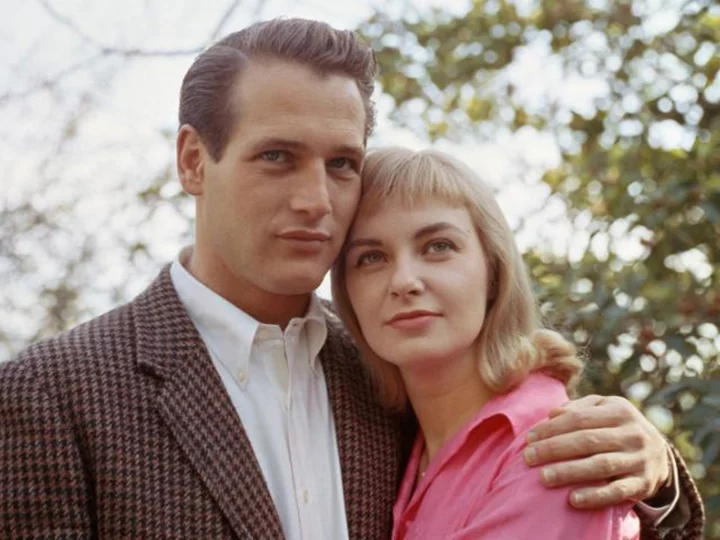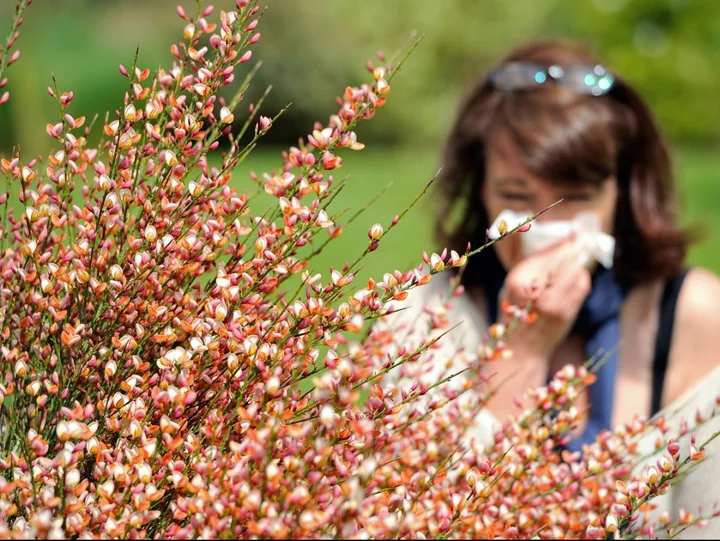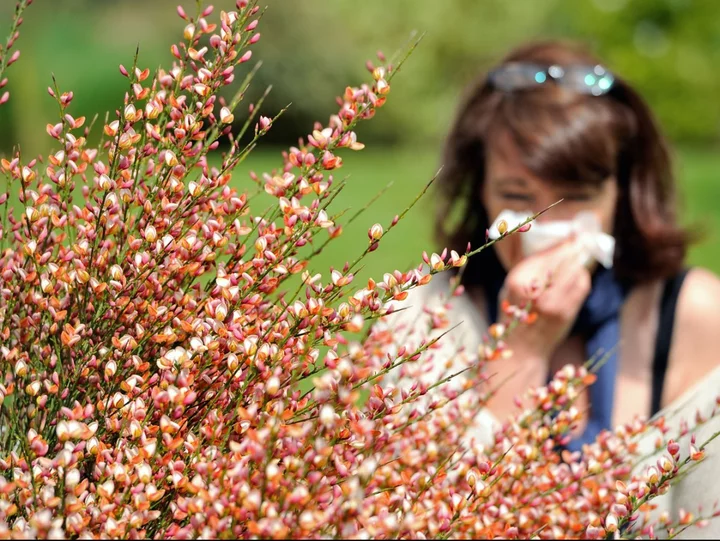
Rolex watches, race suits and a quirky tin pig bench. Paul Newman's items go on sale
For more than 50 years, the famously passionate and long-lasting marriage between actors Paul Newman and Joanne Woodward entranced Hollywood during its "Golden Age."
2023-06-02 01:24

Thousands march in Jerusalem Pride parade, first under Israel's most right-wing government ever
Thousands of people have taken part in Jerusalem’s Pride parade
2023-06-02 00:51

I tried Allevia to find out if it’s a hay fever cure
Spring has always been a transformative season for me. As the the weather improves, so, too, does my mood. But there has always been one thing that makes the move from winter much, much worse: my hay fever. Like one in 10 children and one in four adults, according to the Met Office, I have always suffered with hay fever. With that number rising year on year too, it’s likely that if you don’t get symptoms yourself, you’ll know someone who does. For me, the worst symptom has always been unbearably itchy, watery eyes, although the constant sneezing isn’t that much fun either. Other symptoms include itchy mouth, ears and throat, coughing, a blocked nose and many more. For a few years I took prescription strength Loratadine (Clarityn), which worked for a while, up to a point. The symptoms reduced but I was always able to tell when it was a day with high pollen in the air because my eyes would still itch and the sneezes would come and go. If it was the best the doctor could do, then I’d just have to put up with the remaining symptoms, which were reduced. Eventually, Loratadine stopped being as effective. I mentioned it in passing to my GP when I was there for an appointment about something else. “We’ll try something different,” she said. Enter Fenofaxidine. It seems too much to say that Fenofaxide changed my life but, in hay fever terms, it was a total gamechanger. The medication stopped my symptoms instantly. No more sneezing, no more itchy eyes, no more hay fever. Obviously, I’m not a medical professional but it didn’t stop me telling everyone I know with hay fever to speak to their doctor about it. My mum, also a lifelong sufferer, saw the same effects as I did. So when I saw an advert last year for Allevia (a brand name for over-the-counter Fenofaxidine), I knew the potential its declassification could have on hayfever sufferers in the UK. I wasn’t surprised when it sold out after going viral on TikTok last year. One review said: “This actually works. I’m impressed. My eyes are not bulging because they are itching. I feel good, I can enjoy the sun,” she said. Hay fever isn’t life or death, nor should it be treated as such, but for someone whose mood is so dramatically increased by spending time outside it has made quite a big difference to me – the simple pleasure of being able to enjoy the sun. Read More The popular £4 hay fever tablet that ‘cures all symptoms’ Festival checklist 2023: Camping gear, clothing, beauty and more essentials Why do we get hay fever and what are the symptoms?
2023-06-02 00:50

5 simple ways to step up your business's TikTok game
A single viral video on TikTok can launch your business into the stratosphere
2023-06-01 23:29

This Halibut Ceviche Is the Easiest Seafood Dish You'll Make This Summer
The halibut in this ceviche "cooks" in a simple lime marinade.
2023-06-01 23:26

Porn icon Angela White reveals 'mortifying' decision which made her a better performer
Porn legend Angela White has revealed that an decision early into her career in the industry ultimately helped her become a better performer even though it was "mortifying." In a recent appearance on the Pillow Talk podcast the 38-year-old Australian star recently made news after it was reported that she was hospitalised after acting in a particularly long scene, something which she later claimed was "blown out of proportion." Now White has claimed that one of the things that made her better at her job was the fact that she used to edit herself. Talking to the Pillow Talk hosts, White stated: "Early on, I edited my own scenes, so it made me a better performer. I directed my own scenes." Sign up to our free Indy100 weekly newsletter She also stressed to co-hosts Whitney Cummings and Ryan Pownall: "It's mortifying in the beginning because you see everything you do terribly wrong. But it just makes you a better performer. You learn you shouldn't be positioning my body in [this or] that way." She added: "Very small micro movements makes the biggest difference in porn... It's not just about looking into the camera." Elsewhere, White recently spoke out against people who were 'mad' at her for teaching at a prestigious university in California. There have also been hints that White is looking to start a new career in podcasting. Have your say in our news democracy. Click the upvote icon at the top of the page to help raise this article through the indy100 rankings.
2023-06-01 23:21

Sotheby’s Will Buy Whitney Museum’s Breuer Building for About $100 Million
A New York City landmark has a new owner. The onetime home of the Whitney Museum of American
2023-06-01 23:15

Abandoned Russian Superyacht to Be Auctioned After Sanctions Lifted
The US Treasury removed an abandoned $120 million Russian superyacht from its sanctions list, clearing the way for
2023-06-01 22:47

FDA warns consumers not to use off-brand versions of Ozempic, Wegovy
The U.S. Food and Drug Administration is warning consumers not to use versions of the popular weight-loss drug used in Ozempic and Wegovy and sold online because they might not contain the same ingredients as prescription products and may not be safe or effective
2023-06-01 22:25

Tan France welcomes second baby with husband Rob France via surrogate
Queer Eye star Tan France and his husband Rob France have welcomed their second baby together via surrogate. The 39-year-old reality TV star confirmed the birth of their son, Isaac, on Instagram. “Welcome baby boy #2, Isaac France, born this past weekend. He completes our little family perfectly,” he captioned the post, which featured the new family of four. The Next in Fashion host also shared his thanks for their surrogate, writing, “And a huge thank you to our incredible warrior of a surrogate, for giving us the greatest gift one could ever give.” In the comments, France’s fellow Queer Eye co-stars rushed to congratulate the couple on their newest addition. Bobby Berk wrote, “My babies havin babies,” while Karamo Brown said: “So happy for the world to meet your new beautiful baby!!! What a blessed family!” “Awee Tannay!!!! Cutest family,” commented Jonathan Van Ness. France announced on 13 April that he and his illustrator husband were welcoming a new addition to their family summer. In August 2021, the parents welcomed their eldest son, Ismail, who was born prematurely. In a video clip posted to Instagram, France revealed that the couple have been wanting to expand their family for a “long time”. “Hard to believe it was two years ago today we announced Ismail was on his way! And today – we couldn’t be prouder to share that he’s going to be a big brother!” France captioned the post. “Becoming dads has been our greatest joy, and we are so excited to grow our family with the help of our wonderful surrogate.” The British-American fashion designer previously recalled the moment he and his husband learned their surrogate was pregnant last December. “We were over the moon,” France said in an interview with People in April. “It was the best feeling ever. I mean, it felt almost as shocking as the first time. I was overjoyed, in tears, I couldn’t believe that it had finally happened again. It was just the most incredible feeling.” France explained that the couple decided to have another child because they wanted their son Ismail to have a built-in best friend that was also close in age. "We wanted him to have someone that will be his person that he’s tethered to,” France told the outlet. “I’m really close with my siblings and my husband is really close with his, so we wanted to create a family where [our child] would have more support other than just Rob and I.” He added the most exciting part about expecting another baby is that Ismail will “have somebody hopefully for the rest of his life that he gets to call his person”. While he revealed that the couple already know the sex of their unborn baby, they won’t be sharing it with fans just yet. However, the two have already picked out a name for baby number two. Speaking to People, France also gave insight into the couple’s “wonderful” relationship with their surrogate, whom he praised as an “incredible woman.” “The only thing that’s different is that she’s out of state,” said France, who lives in Salt Lake City, Utah. “So we don’t get to see her in real life as much, but we see her on FaceTime or Zoom. We text regularly, and so it’s been great.” In August 2021, Tan France and husband Rob welcomed their eldest child Ismail seven weeks earlier than his due date. The newborn spent three weeks in the NICU (newborn intensive care unit) before he was taken home. “Give our son a warm welcome,” France captioned a photo of the parents smiling with their son. “Ismail France, born July 10th.” “He came seven weeks early, so he’s been in the NICU for the past three weeks,” he wrote. “But, today, we finally got to bring him home. We love him so, so much. Like, fully obsessed.” France added that their surrogate was “doing so great” post-labour and they “couldn’t be more grateful for the greatest gift in our lives.” Read More Tan France reveals his grandfather used to make knockoff Disney products Queer Eye’s Tan France welcomes first child after surrogate gives birth seven weeks early Queer Eye’s Antoni Porowski engaged to boyfriend Kevin Harrington How a hay fever medication transformed my life Dermatologist horrifies viewers by discussing mites that live in your skin ‘Unsupportive backgrounds’ make LGBT+ youth twice as likely to have suicidal thoughts – report finds
2023-06-01 21:58

How a hay fever medication transformed my life
Spring has always been a transformative season for me. As the the weather improves, so, too, does my mood. But there has always been one thing that makes the move from winter much, much worse: my hay fever. Like one in 10 children and one in four adults, according to the Met Office, I have always suffered with hay fever. With that number rising year on year too, it’s likely that if you don’t get symptoms yourself, you’ll know someone who does. For me, the worst symptom has always been unbearably itchy, watery eyes, although the constant sneezing isn’t that much fun either. Other symptoms include itchy mouth, ears and throat, coughing, a blocked nose and many more. For a few years I took prescription strength Loratadine (Clarityn), which worked for a while, up to a point. The symptoms reduced but I was always able to tell when it was a day with high pollen in the air because my eyes would still itch and the sneezes would come and go. If it was the best the doctor could do, then I’d just have to put up with the remaining symptoms, which were reduced. Eventually, Loratadine stopped being as effective. I mentioned it in passing to my GP when I was there for an appointment about something else. “We’ll try something different,” she said. Enter Fenofaxidine. It seems too much to say that Fenofaxide changed my life but, in hay fever terms, it was a total gamechanger. The medication stopped my symptoms instantly. No more sneezing, no more itchy eyes, no more hay fever. Obviously, I’m not a medical professional but it didn’t stop me telling everyone I know with hay fever to speak to their doctor about it. My mum, also a lifelong sufferer, saw the same effects as I did. So when I saw an advert last year for Allevia (a brand name for over-the-counter Fenofaxidine), I knew the potential its declassification could have on hayfever sufferers in the UK. I wasn’t surprised when it sold out after going viral on TikTok last year. One review said: “This actually works. I’m impressed. My eyes are not bulging because they are itching. I feel good, I can enjoy the sun,” she said. Hay fever isn’t life or death, nor should it be treated as such, but for someone whose mood is so dramatically increased by spending time outside it has made quite a big difference to me – the simple pleasure of being able to enjoy the sun. Read More The popular £4 hay fever tablet that ‘cures all symptoms’ Festival checklist 2023: Camping gear, clothing, beauty and more essentials Why do we get hay fever and what are the symptoms?
2023-06-01 21:52

‘Unsupportive backgrounds’ make LGBT+ youth twice as likely to have suicidal thoughts – report finds
Young LGBT+ people who weren’t supported at home and school are more than twice as likely to have had suicidal thoughts and feelings than supported peers, a new report has found. Those from unsupportive backgrounds are also nearly twice as likely to have self-harmed, nearly half as likely to say they are happy in adulthood (43% vs 85%), and more than three times as likely to ‘never or rarely’ feel optimistic about their future – according to the findings from Just Like Us. The LGBT+ young people’s charity surveyed 3,695 people aged 18-25, including 1,736 LGBT+ young adults from across the UK. The ‘Positive Futures‘ report also found unsupported young LGBT+ people were significantly more likely to have experienced panic attacks and depression. What does an ‘unsupportive background’ mean? “An unsupportive time growing up can look like being bullied at school, never hearing that it’s OK to be LGBT+, facing family rejection and even estrangement, and not having any role models to look up to – all simply because you are LGBT+,” Amy Ashenden, Just Like Us interim CEO, told PA Media. “Sadly for lots of LGBT+ young people today, that remains a really gruelling reality. When we look at the research findings, we can see it’d be foolish to think growing up LGBT+ is not still incredibly tough.” How can you help support young LGBT+ people? Ashenden added: “Anyone who cares for and about young people has a role to play – whether or not you think they might come out as LGBT+ one day. We are calling particularly on parents, guardians and teachers to be more vocal in their support for LGBT+ people from the outset. “From the research, we know that LGBT+ young people wish they’d had these conversations from nursery age, which simply looks like saying: LGBT+ people exist and I support them. I’m proud to be an ally. “As a parent, you could mention a TV character or a person you know who is LGBT+ and you could mention how you admire their courage to be out and proud, or talk to them about how they are free to be who they are, different gender expressions included, and that you don’t agree with the harmful things sometimes said about trans people,” Ashenden said. Listening without judgement If a young person tells you they’re worried about coming out as LGBT+ and you’re unsure how to respond, remember there can be great value in just being a supportive listener. “The most important thing when a young person feels vulnerable or scared about coming out is providing a safe and supportive environment for that person to share their feelings, and to help them overcome their anxieties,” said Robert Common, an LGBT psychotherapist and founder/group CEO of The Beekeeper House. “Your role is to listen, and to allow them to express themselves without fear of judgement. You don’t need to be there to offer solutions – and be mindful of giving advice you’re not sure will be helpful or effective. You should remind them that they aren’t alone; there are many support groups and resources out there to help them.” Common added that ‘coming out’ isn’t just one conversation, either. For some young people, there may be anxiety about whether they will be accepted. “There’s a misconception that coming out is one big momentous point in time, but in reality, it’s a process. Although it shouldn’t be this way, the journey of acceptance can take a long time for some individuals, including family,” Common explained. “Young people in this situation should know that they should always come out on their own terms, whilst prioritising their safety and wellbeing. “If they do feel at risk from coming out to family, [gently encourage] them to talk through what the risks might look like and how to make contingency plans if they are faced with any kind of negative reaction or discrimination.” Signposting and community If a young LGBT+ person needs support and is facing difficulties, there are organisations that can help. Signposting them towards these can be a helpful step. For example, Common suggested: “The Albert Kennedy Trust (akt.org.uk), for LGBT young people who are homeless or living in a hostile environment. They can help with finding emergency accommodation as well as employment, education and training for those who need to support themselves.” Finding community can also be helpful – and “crucial for individuals that feel isolated or alone”, Common added. “The LGBTQ+ community is diverse, so when speaking to someone coming out, you can encourage them to see which parts of that community they identify with and relate to the most.” Many mental health charities like Mind (mind.org.uk) also offer specific advice for LGBTQ+ people, and the LGBT+ anti-abuse charity Galop (galop.org.uk) can provide support to those who have experienced violence or abuse. Read More Charity boss speaks out over ‘traumatic’ encounter with royal aide Ukraine war’s heaviest fight rages in east - follow live As Pride Month begins: 5 LGBTQ+ icons who have helped shape pop culture and history 10 ways to explain dementia to children How to make your home summer ready
2023-06-01 20:29
